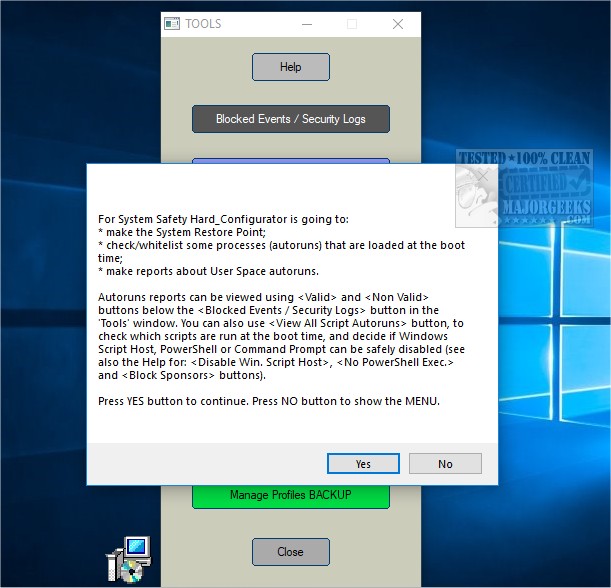Hard_Configurator is a graphical user interface for advanced users only to manage Software Restriction Policies (SRP) and harden Windows Home editions from Vista up.
Hard_Configurator is a graphical user interface for advanced users only to manage Software Restriction Policies (SRP) and harden Windows Home editions from Vista up.
This program can configure Windows built-in security to harden the system. When you close Hard_Configurator, it closes all its processes. The real-time protection comes from the reconfigured Windows settings. Hard_Configurator can be seen as a Medium Integrity Level smart default-deny setup, which is based on the SRP + Application Reputation Service (forced SmartScreen) + Windows hardening settings (restricting vulnerable features).
Hard_Configurator makes changes in Windows Registry to accomplish the tasks enumerated below:
Enabling Software Restriction Policies in Windows Home editions.
Changing SRP Security Levels, Enforcement options, and Designated File Types.
Whitelisting files in SRP by path (also with wildcards) and by hash.
Blocking vulnerable system executables via SRP (Bouncer blacklist).
Protecting (deny execution) writable subfolders in "C:Windows" folder (via SRP).
Restricting shortcut execution to some folders only (via SRP).
Enabling Windows Defender advanced settings, like PUA protection, ASR rules, Network Protection, etc.
Protecting against weaponized documents, when MS Office and Adobe Acrobat Reader XI/DC are used to open them.
Enabling Run as administrator for MSI files.
Disabling PowerShell script execution (Windows 7+).
Securing PowerShell by Constrained Language mode (SRP, PowerShell 5.0+)
Disabling execution of scripts managed by Windows Script Host.
Removing "Run As Administrator" option from the Explorer right-clicks context menu.
Forcing SmartScreen check for files without 'Mark Of The Web' (Windows 8+).
Disabling Remote Desktop, Remote Assistance, Remote Shell, and Remote Registry.
Disabling execution of 16-bit applications.
Securing Shell Extensions.
Disabling SMB protocols.
Disabling program elevation on Standard User Account.
Disabling Cached Logons.
Forcing the Secure Attention Sequence before the User Account Control prompt.
Filtering Windows Event Log for blocked file execution events (Nirsoft FullEventLogView).
Filtering autoruns from the User Space, and script autoruns from anywhere (Sysinternals Autoruns).
Enabling & Filtering Advanced SRP logging.
Turning ON/OFF all the above restrictions.
Restoring Windows Defaults.
Making System Restore Point.
Using predefined setting profiles for Windows 7, Windows 8, and Windows 10.
Saving the chosen restrictions as a profile, and restoring when needed.
Backup management for Profile Base (whitelist profiles and setting profiles).
Changing GUI skin.
Updating application.
Uninstalling application (Windows defaults restored).
Most of what Hard_Configurator does can be accomplished with the registry. A System Restore point will be automatically created, and we recommend you also back up your registry. Once again, this is for advanced users who know what they're doing. There is a Restore Windows Default and Uninstall built into the GUI.
Similar:
What's the Best Antivirus and Is Windows Defender Good Enough?
How to Tell the Difference Between a Virus and a False Positive
Which Anti-Malware App Is Best and Can It Run Alongside My Antivirus
What to Do When Your Norton or McAfee Antivirus Expire
How to Install Avast as a Lightweight Antivirus
How to Disable All Advertising and Sponsored Apps in Windows 10
How to Turn Diagnostic Data Settings on or off in Windows 10
How to Disable Windows 10 Activity History Permanently
Download


